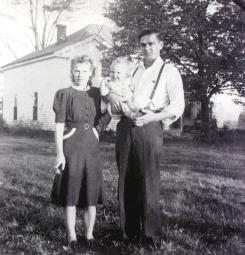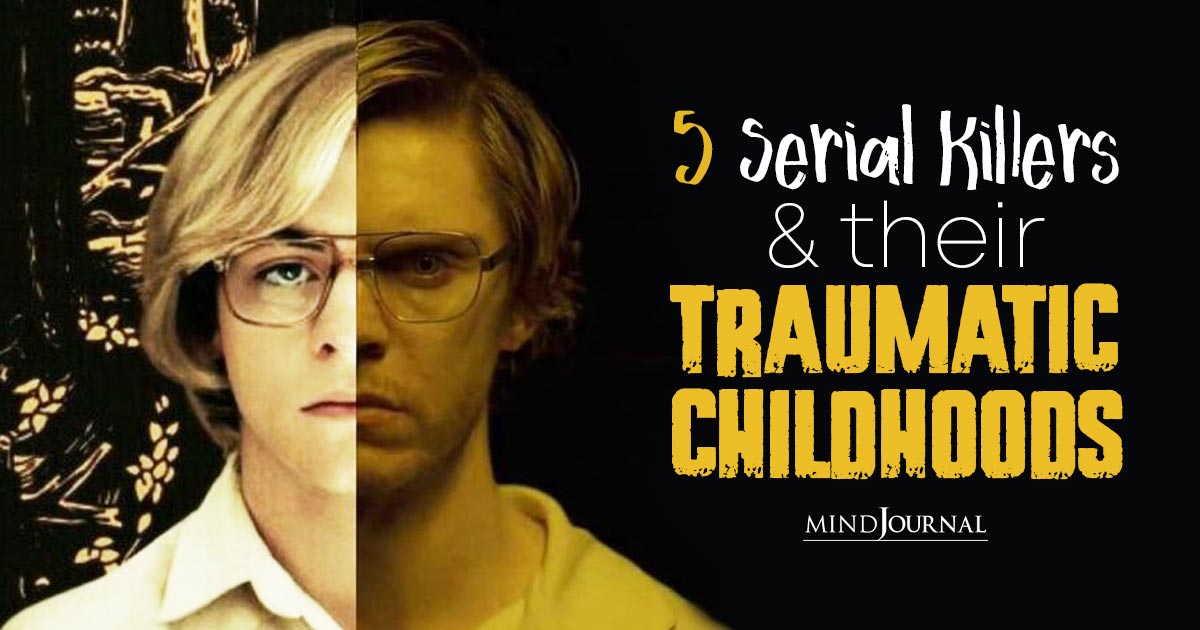The public’s fascination with the mystery surrounding serial killers has long sparked conjecture regarding the motivations behind people’s horrific behavior. The role of childhood trauma in serial killers has received a lot of attention, despite the fact that the reasons underlying their actions are complex.
In this blog, we explore the childhood experiences in serial killers to gain insight into their terrifying world. We aim to uncover the intricate relationship between pathology and upbringing by delving into the trauma in serial killers and unfavorable conditions that shaped these individuals’ early years.
This will illuminate the shadowy pasts of some of the most infamous murderers in history. Come along with us as we venture into the darkest recesses of the human brain, where the roots of violence are planted.
1. Ted Bundy
Many horrific events that occurred during Ted Bundy’s early years probably influenced his eventual transformation into a serial killer. Bundy was born Theodore Robert Cowell on November 24, 1946, and his early years were turbulent and mysterious. Bundy was born at a Vermont home for unmarried women to his single mother, Louise Cowell. Bundy was not told this information until he was a teenager. He was raised with the belief that his mother was his sister and that his grandparents were his parents.
When Bundy was still a small child, his mother abruptly left his life, which had a further negative effect on his early years. Louise left Bundy to grow up with his grandparents in Philadelphia and relocated to Washington State to be with family. Bundy probably had a great deal of mental distress as a result of his mother’s abrupt departure, which added to his emotions of disorientation and abandonment.
In addition, there was a lot of hostility and violence in Bundy’s connection with his grandpa, Samuel Cowell. According to Bundy, his grandfather was a harsh and emotionally aloof man who physically punished him for small transgressions. A later struggle with rage and aggression may have been exacerbated by this unstable and abusive environment Bundy lived in.
All things considered, Bundy’s traumatic childhood—which included the loss of his biological father, lying about his parentage, and being abused by his grandfather—likely had a major impact on his psychological make-up and contributed to his eventual decline into violence and criminality.
2. Jeffrey Dahmer
Instability, dysfunction, and early indications of unsettling behavior that would presage his career as a serial killer characterized Jeffrey Dahmer’s early years. Dahmer was born in Milwaukee, Wisconsin, on May 21, 1960, and was raised in a home where there was emotional upheaval and marital strife.
Lionel and Joyce Dahmer, Dahmer’s parents, had a turbulent relationship characterized by frequent disputes and infidelity. Over time, their marriage broke down, and when Dahmer was still a teenager, they got divorced. It’s possible that his parents’ divorce affected his early years by making him feel unstable and abandoned.
Apart from the chaos in his family, Dahmer showed concerning conduct even as a small child. He displayed the standard symptoms of a developing sociopath, including an early preoccupation with dissecting and mutilating animals. Family members and teachers expressed alarm about Dahmer’s behavior, yet his acts remained mostly undetected, allowing his sinister impulses to flourish unchecked.
The dissolution of Dahmer’s parents’ marriage, emotional upheaval at home, and the emergence of his first signs of deviant behavior during his traumatic childhood probably had a major impact on how he developed psychologically and contributed to his eventual decline into violence and depravity.

3.Aileen Wournos
Aileen Wuornos had a difficult upbringing filled with abuse, neglect, and abandonment. Wuornos was born in Rochester, Michigan on February 29, 1956, but his early years were marked by dysfunction and volatility.
When Wuornos was born, her parents, Diane Wuornos and Leo Pittman, were both in their teens and dealing with personal issues. Wuornos’s mother was unable to care for her because of her own problems with alcoholism and mental illness, and her father was a convicted child molester who was imprisoned at the time of Wuornos’s birth. Wuornos’ mother consequently deserted her, leaving her in the custody of her grandparents.
Wuornos’s severe and authoritarian grandparents further damaged her upbringing by abusing and neglecting her. She endured verbal and physical abuse, including beatings and verbal berating, which severely damaged her mental health.
Wuornos struggled to find security and stability as a child because of the turbulent and chaotic atmosphere in which he was raised. She was left to fend for herself on the streets after running away from home at a young age, turning to prostitution and crime as a means of subsistence.

Wuornos’s abusive, neglectful, and abandoned upbringing probably had a big impact on how she developed psychologically and contributed to her eventual turn toward violence and crime.
4.Richard Ramirez
Richard Ramirez, popularly known as the “Night Stalker,” had a difficult upbringing filled with witnessing abuse and violence. Ramirez was born in El Paso, Texas, on February 29, 1960. He was raised in a dysfunctional and unstable home.
Richard and his siblings suffered physical abuse at the hands of their violently temperamental father, Julian Ramirez. Ramirez was exposed to his father’s violent outbursts at an early age, which had a long-lasting psychological effect on him and made him feel insecure and afraid.
Ramirez was subjected to violence and criminal activity in his neighborhood in addition to the trauma he experienced at home, which further influenced his outlook. At a young age, he was exposed to terrible pictures of death and violence, including the aftermath of a vicious murder that happened close to his home.

Ramirez was exposed to violence and abuse both at home and in his community during his tragic youth, which is likely what shaped his psychological development and contributed to his eventual decline into violence and criminality as the infamous “Night Stalker.”
5.Ed Gein
A string of horrific events that defined Ed Gein’s early years later played a part in his spiral into lunacy and notoriety. Gein was raised in a modest, remote farmhouse alongside his parents, Augusta and George Gein, and his older brother, Henry. He was born in La Crosse County, Wisconsin, on August 27, 1906.
Gein was raised by his controlling and deeply religious mother, Augusta, who made him feel deeply ashamed and afraid. She warned her sons about the perils of women and sexuality and delivered fiery sermons denouncing the transgressions of the world. Gein was emotionally stunted and socially secluded, having few friends and little interaction with the outside world as a result of Augusta’s harsh and oppressive upbringing.
Gein not only had a difficult relationship with his mother but also lost his father when he was a little child. Following George Gein’s death in 1940, Augusta and her two sons were left to manage the family farm on their own. Gein’s sentiments of desertion and isolation were made worse by the death of his father, which made him more emotionally open to his mother’s influence.

All things considered, Ed Gein’s terrible upbringing—which included his father’s death, his mother’s controlling presence, and religious fanaticism—formed the foundation for the deranged and disturbed person he would eventually become. He was raised with a strong sense of guilt and self-loathing, which would eventually show in his horrific and macabre acts as one of the most well-known serial killers in America.
So after reading this blog who do you think had the worst childhood?
Also read this to get your fill of more Women Killers: 10 Blood-Curdling Films & TV Series About Women Killers – Mind Help
FAQ
What role does early trauma have in the emergence of serial killers?
An individual’s psychological development can be significantly impacted by childhood trauma, which can mold a person’s behaviors, beliefs, and coping strategies. Abuse, neglect, or other types of trauma experienced as children may have had a role in the development of aggressive inclinations and an antisocial disposition in certain serial killers.
Do all serial killers have a history of trauma from childhood?
Although it is a prevalent factor among many serial killers, not all of them experienced childhood trauma. Some people who grow up to commit serial killings might have had somewhat secure or even wealthy upbringings. On the other hand, trauma can have a profound effect on a person’s development and raise their likelihood of acting violently. 3.Can someone who receives early help or intervention avoid becoming a serial killer?
Can someone who receives early help or intervention avoid becoming a serial killer?
People who receive early intervention and assistance are less likely to engage in violent conduct and the effects of childhood trauma are less likely to be severe. Giving at-risk people access to support services, positive role models, and mental health resources might help them build resilient coping strategies and resilience against unfavorable outcomes in the future. But it’s crucial to understand that every case is different and that not everyone who experiences trauma will go on to commit serial killings.




Leave a Reply